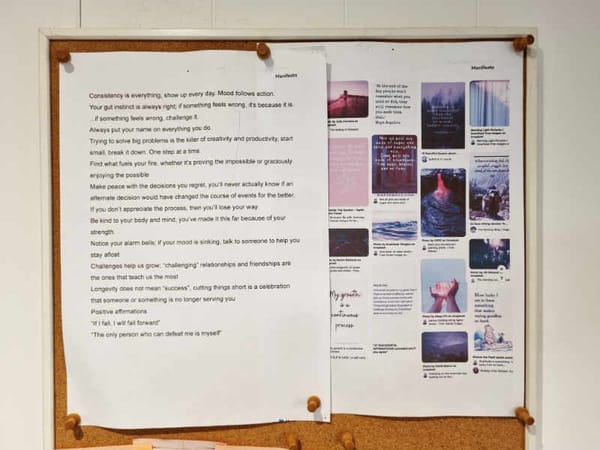3 early signs of burnout and how to overcome it
Full admission: I'm burnt out and I took this week off to recover. Here's what I learnt throughout the process.

I’m burnt out. After weeks of pushing my luck, it’s finally caught up with me, resulting in going to the doctor’s walk-in centre and begging for pain relief. I always thought burnout was an emotional condition related to overworking but this week my body showed me otherwise. As I wait in the queue for the GP, I decide to show up to my self-care party, albeit a little late, and listen to a couple of podcasts on - you guessed it - burnout!
I’m going to share with you the signs of burnout I should’ve listen to and what I’m doing to move through it.
What is burnout?
Burnout is now an official medical diagnosis, according to the World Health Organisation, they offer one definition that really resonates with me: “feelings of energy depletion or exhaustion”1.
Traditionally burnout has bounced around the world of work, with some early definitions of burnout as the moment when you separate yourself emotionally from work instead of investing in yourself and feeling like it’s meaningful2. Or working hard for something that isn’t making a difference, a feeling disengaged, but still working hard anyway. Organisational psychologist, Adam Grant, defied that burnout isn’t about working long hours though, he talked about the emotions you feel about the long hours3.
If it’s down to the feeling of emotions, then the context of burnout is not exclusive to work. And in the podcast I was listening to, the closure came thick and fast on this:
“The factor that lead to burnout are not just professional ones. They are parenting and social activism and anything where you need to care and invest, where there are ongoing demands that are unmeetable expectations and increasing demands. That is the formula, no matter what the context”.
I connected to this beyond other definitions, with the term ‘ongoing demands’ echoing in my head like a CD with a scratch on it (remember when that used to be a problem?)
When I did a post-mortem in my head of the last few weeks and it was packed full of unmeetable expectations; the solo parenting, busy weekends, increased travel, increased workload, half marathon training and distinct lack of rest and time.
I threw myself a hand grenade of burnout weeks ago, it was just a question of when it was going to go off.
There were 3 signs I identified:
Sign 1 - Overload
As well as a life/career coach, I’m also a health and fitness coach and I’m fascinated with the parallels between physical training and progression and performance in the workplace.

In any good training programme, I think about overload; increasing intensity to encourage progression to achieve the fitness goals. But if my client was to deadlift 15kg one week and then 50kg the next week, there’s a really good chance they’d get injured. Sure, the body might copes with the additional load in that session, but after time, it will struggles and fails with the increased load.
It’s exactly the same in other pockets of your life only it’s not quite as visual as a weight being added to the bar. One week you’re managing your workload effectively, the next week, a colleague is off and you’re picking up on twice the amount of work, or your partner is sick and you need to do the grocery shop, cook dinner and put the kids to bed, all after a day’s work. You may cope with it for a few days but it’s only a matter of time before it catches up with you.
What you can do to help prevent overload in 3 steps:
- Firstly, write a list with everything that’s in your head, we’re not interested in ticking things off, it’s just about externalising the problem and getting a sense of scale
- To gain focus, can you ask yourself this question: “What is important to me this week?”
- To help with prioritising the right thing, can you ask yourself this: “If I don’t do X by the end of today, what will happen?” and put down arrows next to the tasks you’re not going to do this week
You may have tried these before, let me know in the comments if you’ve done something else to help with overload.
Sign 2 - Increased withdrawal from everything!
I always get a resounding nod in agreement when I share this sign with others:
When I’m on the pathway to burnout, I start to become passive, I get gradually more and more insular and eventually I stop externalising my needs.
The irrational thoughts begin to dominate, whirring round in my head like a carousel until it gets to the point of exhaustion and I almost become numb. There were moments within the last few weeks where I internalised thoughts, bottled emotional energy and then woke up the next day, continuing life as if nothing had happened.
What you can do to stop withdrawal:
Ok, when this is happening to me it’s normally because things are pretty severe so my advice would be:
- Get out of the house, go for a coffee, meet a friend or just sit in a relatively busy area where you have a chance of speaking with someone, even if just for 5 minutes.
- Build upon this by calling someone or making a conscious effort to talk a loved one as soon as they are available (if no-one is available, then journal)
- The topic doesn’t have to be about you if you don’t want it to be, but I highly recommend you share a fraction of what’s in your head with someone.
More often than not, you’ve built a narrative which has intensified during each spin of the carousel. Someone else can help slow things down so you can get off the horse, take a step back and take in the bigger picture.
Sign 3 - My gut instinct kicked in right from the beginning
My rational brain was saying stop, my irrational brain was telling me to keep going. Professor Steve Peters calls out the different parts of our brain with an analogy, the rational pre-fontal part of the brain is rational, the limbic part of the brain is emotional, it’s the chimp. And in my case, the last few weeks the chimp has been winning.
Prof Steve Peters uses the Chimp Paradox to explore how emotions can be controlled when conflicts like this arise, his first lesson is: “There are two competing forces in your brain, so learn to recognise them.”
My body was slowly getting more and more tired, but I was trying to squeeze and condense things into each day and so while things were being added to my day or week, I wasn’t taking anything out so I was gradually becoming more and more tired. Instead of listening to my gut, I just kept being busy.
Two ways to tune into your rational brain:
There is a reason why taking a short walk can do wonders for our mental health, it creates the space to just be. Better yet, you are showing yourself that you can care for yourself.

I do a beautiful visualisation exercise with my clients:
- There are two chairs in the room you’re in at the moment (and if there isn’t - just imagine it’s there!)
- Imagine your best friend is sat on the other chair, and if you want to, you’re welcome to sit on that chair and say hello to yourself
- Begin the conversation with your best friend, start by telling them the problem (bear with me on this!)
- Now over to your friend, what might they ask? What might they say to you?
I’m so good at giving advice to others but so awful at listening to my own advice. The objective of this exercise is to imagine what this person might say to us at this moment of crisis.
I always hear my husband’s voice saying “Should you be doing that?” - sometimes it’s annoying how built-in that question is, and he will laugh when he reads this admission. But it’s true, hearing someone else’s voice, particularly someone who cares for me and knows me inside out, has helped me to develop a counter-narrative that could intervene with a vicious cycle.
Which leads me beautifully onto my conclusion.
The way to solve burnout is not through self-care
Now we’re near the end of my post, I can share the podcast I was listening to which highlights why my self-care party that I turned up to late, wasn’t actually worth visiting.
Self-care is not the way to combat burnout.
The way to get out of burnout is by surrounding yourself with people who’s interest in your health and wellbeing is as important to them as it is to you.
If you’re still reading this, then I urge you to think about this, reflect on who is around you and how they can support you.
Watch ‘The Cure for Burnout (hint: it isn’t self-care)’
World Health Organisation - Burn-out an "occupational phenomenon": International Classification of Diseases ↩
Herbert Freudenberger, 1970s, cited from TED “The Cure of burnout (hint: it isn’t self-care) ↩





